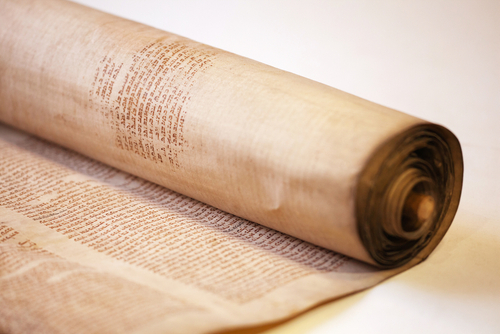Isaiah 57:14-58:14
In the morning haftarah of the ultimate fast day and the holiest day of the year, God lambasts His people for their hypocrisy when fasting for Him. Such fasting is worthless unless their society actively promotes the welfare of its most vulnerable, with whom He primarily dwells. Indeed, greed and callousness were primary reasons for exiling His people. While God has mercy on His people, He will restore them spiritually and physically only when they feed their poor, clothe their naked, avoid treachery and deceit when transacting with others, and observe the Sabbath.
Haftarah Breakdown
Verse 57:14-19: God was angry with His people, but now has mercy upon them.
| Isaiah 57:16 | ישעיהו נ״ז:ט״ז |
| For I will not contend forever, neither will I be wroth to eternity, when a spirit from before Me humbles itself, and souls [which] I have made. | כִּ֣י לֹ֤א לְעוֹלָם֙ אָרִ֔יב וְלֹ֥א לָנֶ֖צַח אֶקְּצ֑וֹף כִּי־ר֙וּחַ֙ מִלְּפָנַ֣י יַֽעֲט֔וֹף וּנְשָׁמ֖וֹת אֲנִ֥י עָשִֽׂיתִי׃ |
Verses 57:20-21: But God will not have mercy on the wicked.
| Isaiah 57:21 | ישעיהו נ״ז:כ״א |
| “There is no peace,” says my God, “for the wicked.” | אֵ֣ין שָׁל֔וֹם אָמַ֥ר אֱלֹקָי לָרְשָׁעִֽים׃ (ס) |
Verses 58:1-5: God does not desire the empty “religious” fasting of his people.
| Isaiah 58:5 | ישעיהו נ״ח:ה |
| Is such the fast I desire, a day of man’s afflicting his soul? Is it to bend his head like a fishhook, and spread out sackcloth and ashes? Will you call this a fast and an acceptable day to the Lord? | הֲכָזֶ֗ה יִֽהְיֶה֙ צ֣וֹם אֶבְחָרֵ֔הוּ י֛וֹם עַנּ֥וֹת אָדָ֖ם נַפְשׁ֑וֹ הֲלָכֹ֨ף כְּאַגְמֹ֜ן רֹאשׁ֗וֹ וְשַׂ֤ק וָאֵ֙פֶר֙ יַצִּ֔יעַ הֲלָזֶה֙ תִּקְרָא־צ֔וֹם וְי֥וֹם רָצ֖וֹן לַה’ |
Verses 58:6-7: “The Fast I Desire”- God wants his people to perform justice…
| Isaiah 58:6 | ישעיהו נ״ח:ו |
| No, this is the fast I desire: To undo the fetters of wickedness, to untie the bands of the yoke, and to send free the oppressed, and to break off every yoke. | הֲל֣וֹא זֶה֮ צ֣וֹם אֶבְחָרֵהוּ֒ פַּתֵּ֙חַ֙ חַרְצֻבּ֣וֹת רֶ֔שַׁע הַתֵּ֖ר אֲגֻדּ֣וֹת מוֹטָ֑ה וְשַׁלַּ֤ח רְצוּצִים֙ חָפְשִׁ֔ים וְכָל־מוֹטָ֖ה תְּנַתֵּֽקוּ׃ |
Verses 58:8-12: … and only then will God fully restore them.
| Isaiah 58:10 | ישעיהו נ״ח:י |
| [When] you extend your soul to the hungry, and sate an afflicted soul, [then] your light shall shine in the darkness, and your darkness shall be like noon. | וְתָפֵ֤ק לָֽרָעֵב֙ נַפְשֶׁ֔ךָ וְנֶ֥פֶשׁ נַעֲנָ֖ה תַּשְׂבִּ֑יעַ וְזָרַ֤ח בַּחֹ֙שֶׁךְ֙ אוֹרֶ֔ךָ וַאֲפֵלָתְךָ֖ כַּֽצָּהֳרָֽיִם׃ |
Haftarah Breakdown (cont.)
Verses 58:13-14: Additionally, this just society must observe the Sabbath. If they do, God will greatly reward them.
| Isaiah 58:13-14 | ישעיהו נ״ח:י״ג-י״ד |
| If you restrain your foot because of the Sabbath, from performing your affairs on My holy day, and you call the Sabbath a delight, [and call] the holy [day] of the Lord honored, and you honor it by not doing your [ordinary] ways, and by not pursuing your affairs or discussing your [personal] affairs — then shall you delight with the Lord, and I [God] will cause you to ride on the high places of the land, and I will feed you the heritage of your father, Jacob, for the mouth of the Lord has spoken. | אִם־תָּשִׁ֤יב מִשַּׁבָּת֙ רַגְלֶ֔ךָ עֲשׂ֥וֹת חֲפָצֶ֖יךָ בְּי֣וֹם קָדְשִׁ֑י וְקָרָ֨אתָ לַשַּׁבָּ֜ת עֹ֗נֶג לִקְד֤וֹשׁ יְהוָה֙ מְכֻבָּ֔ד וְכִבַּדְתּוֹ֙ מֵעֲשׂ֣וֹת דְּרָכֶ֔יךָ מִמְּצ֥וֹא חֶפְצְךָ֖ וְדַבֵּ֥ר דָּבָֽר׃ אָ֗ז תִּתְעַנַּג֙ עַל־ה’ וְהִרְכַּבְתִּ֖יךָ עַל־בָּ֣מֳותֵי אָ֑רֶץ וְהַאֲכַלְתִּ֗יךָ נַחֲלַת֙ יַעֲקֹ֣ב אָבִ֔יךָ כִּ֛י פִּ֥י ה’ דִּבֵּֽר׃ (ס) |
Other Connections
The Talmud quotes verse 57:19 to show the power of repentance (Hebrew: תְשׁוּבָה).
| Berakhot 34b | ברכות ל״ד עמוד ב |
| Rabbi Abbahu said: “In the place where penitents stand, the fully righteous do not stand, as [Isaiah 57:19] states, ‘Peace, peace to one who is far, and to one who is near.’ [Peace is extended] first to the one who is far [the penitent], and afterwards [it is extended] to the one who is near [the fully righteous].” | דְּאָמַר רַבִּי אֲבָהוּ: מָקוֹם שֶׁבַּעֲלֵי תְשׁוּבָה עוֹמְדִין — צַדִּיקִים גְּמוּרִים אֵינָם עוֹמְדִין, שֶׁנֶּאֱמַר: ״שָׁלוֹם שָׁלוֹם לָרָחוֹק וְלַקָּרוֹב״. ״לָרָחוֹק״ בְּרֵישָׁא, וַהֲדַר ״לַקָּרוֹב״. |
The Talmud also powerfully utilizes the Haftarah and other sources to define God’s “humility.” Some recite this passage at the end of Shabbat as part of the verses of blessing known as “Vayiten Lecha.”
| Megillah 31a | מגילה ל״א עמוד א |
| Rabbi Yoḥanan said: “Wherever you find [reference in the Bible to] the might of the Holy One, Blessed be He, you also find [reference to] His humility. This fact is written in the Torah, repeated in the Prophets, and stated a third time in the Writings.
It is written in the Torah: ‘For the Lord your God is the God of gods and the Lord of lords,’, after which is written, ‘He executes the judgment of the fatherless and widow’ (Deuteronomy 10:17-18).
It is repeated in the Prophets: ‘For thus says the High and Lofty One that inhabits eternity, Whose name is sacred…,’ after which is written, ‘[… He revives the spirit of] the lowly [and revives] the heart of the contrite ones’ (Isaiah 57:15).
It is stated a third time in the Writings, as is written: ‘Extol Him Who rides upon the clouds, Whose name is the Lord,’ after which is written, ‘A father of the fatherless, and a judge of widows.’ (Psalms 68:5-6)” |
אמר ר’ יוחנן כל מקום שאתה מוצא גבורתו של הקב”ה אתה מוצא ענוותנותו דבר זה כתוב בתורה ושנוי בנביאים ומשולש בכתובים
כתוב בתורה (דברים י, יז) כי ה’ אלהיכם הוא אלקי האלקים ואדוני האדונים וכתיב בתריה עושה משפט יתום ואלמנה
שנוי בנביאים (ישעיהו נז, טו) כה אמר רם ונשא שוכן עד וקדוש וגו’ וכתיב בתריה ואת דכא ושפל רוח
משולש בכתובים דכתיב (תהלים סח, ה) סולו לרוכב בערבות ביה שמו וכתיב בתריה אבי יתומים ודיין אלמנות |
With emendations, biblical translations are by Rabbi A. J. Rosenberg and other translations are from Sefaria.org.
To dedicate, comment, or subscribe, email zbeer570@gmail.com.
